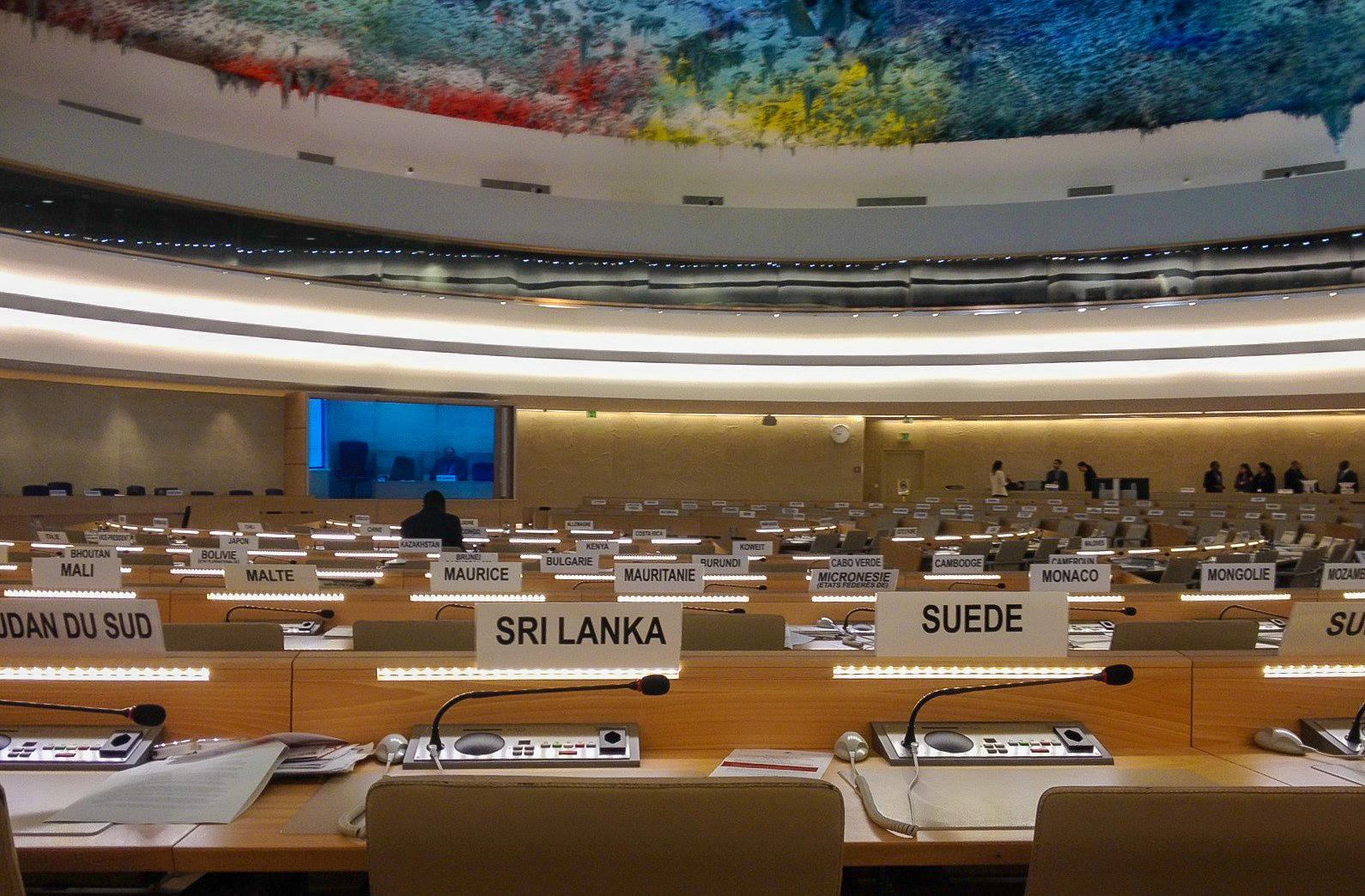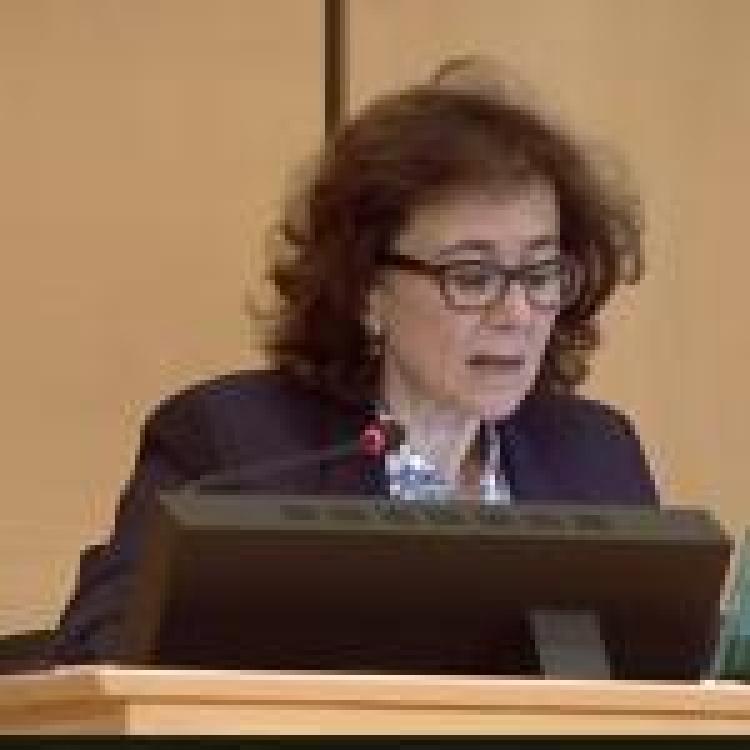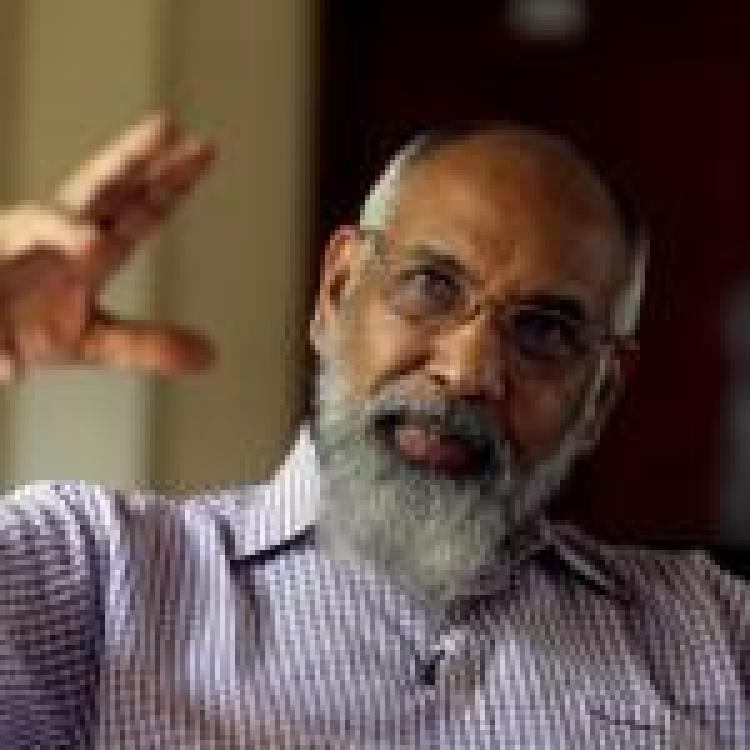 Following the presentation of the damning report on Sri Lanka by the UN High Commissioner for Human Rights, Michelle Bachelet’s damning on report on Sri Lanka, several NGO’s highlighted the prevailing impunity and lack of accountability for human rights violations in Sri Lanka and the failed domestic mechanisms; urging the council to take steps to refer Sri Lanka to the International Criminal Court (ICC) and impose sanctions on known perpetrators.
Following the presentation of the damning report on Sri Lanka by the UN High Commissioner for Human Rights, Michelle Bachelet’s damning on report on Sri Lanka, several NGO’s highlighted the prevailing impunity and lack of accountability for human rights violations in Sri Lanka and the failed domestic mechanisms; urging the council to take steps to refer Sri Lanka to the International Criminal Court (ICC) and impose sanctions on known perpetrators.
Lawyers’ Rights Watch Canada
Ms Harini Sivalingam speaking on behalf of Lawyers’ Rights Watch Canada, highlighted the “deliberate failures” of the state to address past violations against Tamil people. She added that they were disturbed by the systematic pattern of surveillance, harassment and intimidation of human rights defenders, lawyers’ and victims of human rights violations and their families.
She brought to attention the government's continued deterioration and acts of genocide.
“The government’s suppression of memorialization of victims of war crimes, crimes against humanity and genocide, the continued crackdown on protests, as well as the forced cremations of Muslim and other religious minorities under a militarized Covid-19 framework are deeply alarming trends.”
Sivalingam also stressed the need for international intervention to prevent a further decay of human rights.
“These warning signs are evident that Sri Lanka is on the wrong path, and any domestic mechanisms for justice and accountability will fail. International intervention is urgently required to prevent a further decay of human rights. “
She concluded by calling upon the Council to strengthen monitoring of Sri Lanka, take necessary steps towards the referral of Sri Lanka to the ICC and urged member states pursue within their national courts the prosecution of international crimes committed in Sri Lanka and impose sanctions to known perpetrators of human rights violations.
We call upon the Council to:
1. Strengthen its monitoring in Sri Lanka and set out a coherent, effective, and time-bound plan to advance accountability options at the international level;
2.Take the necessary steps towards the referral of the situation in Sri Lanka to the International Criminal Court;
3. Urge Member States to utilize the principle of universal jurisdiction to actively pursue within their national courts the prosecution of international crimes committed in Sri Lanka and to impose sanctions such as travel bans and freezing assets of known perpetrators of grave human rights violations in Sri Lanka
Read the full statement here.
Society for Threatened Peoples
Mr Sahithyan Thilipkumar speaking on behalf of the Society for Threatened Peoples, echoed the High Commissioner’s warning and highlighted the “alarming path towards recurrence of grave human rights violations” and the need for international interventions on mass atrocities to protect Tamil lives.
Mr Thilipkumar reminded the council why Sri Lanka was on the agenda, noting that “tens of thousands of Tamils were killed, predominantly by government shelling”. He noted that “virtually all” massacres committed by Sri Lankan security forces against Tamils remain unpunished and “alleged perpetrators” are currently leading the Sri Lankan state.
He highlighted the Sri Lankan governments repeated failures and lack of political will to serve justice for crimes committed against Tamils.
“The government of Sri Lanka has repeatedly demonstrated its utter lack of political will to serve justice for atrocity crimes against Tamils, who make up the largest group of victims from the conflict and who continue to be affected by ongoing human rights violations”.
Commenting on domestic justice mechanisms, he noted how Tamils have continuously rejected any form of it and called upon the members state to act in line with the High Commissioner’s report.
He urged council members to “make use of the number of options to advance accountability and justice”, including referring Sri Lanka to the ICC alongside practicing extraterritorial and universal jurisdiction.
“In line with the High Commissioner’s report, we urge member states to make use of the number of options to advance accountability and justice, including referring Sri Lanka to the International Criminal Court, as well as practicing extraterritorial and universal jurisdiction”.
His statement also stressed the importance of any evidence gathering mechanism established by member states to have a clear mandated purpose, to prepare case dossiers for the international prosecution of the most serious international crimes and human rights violations.
Concluding his statement, Mr Thilipkumar noted the necessity for international interventions on mass atrocities committed by Sri Lankan security forces.
“Decisive international interventions on mass atrocities committed by Sri Lanka`s security forces are necessary, to protect and promote international human rights and humanitarian law. Tamil lives depend on it, too”.
Read the full statement here.
The International Movement Against All forms of Discrimination and Racism (IMADR)
The IMADR expressed concern with the centralisation of executive powers and the weakening of the independence of the judiciary and domestic commissions.
“Human rights in Sri Lanka are now threatened by the centralisation of executive powers and weakening of the independence of the judiciary and key commissions including the Human Rights Commission and the Office on Missing Persons (OMP). With the rubber-stamping Parliamentary Council, President Rajapaksa has absolute powers to appoint members of these institutions.”
Read the full statement here
International Commission of Jurists (ICJ)
The ICJ highlighted Sri Lanka’s continued incapacity and unwillingness to pursue accountability and justice as “deep rooted” and “longstanding”. Expressing concern over the intensive militarisation of civilian functions and the deteriorating human rights situations as that of a “systemic culture of impunity that will only worsen in the years to come”
The ICJ also endorsed all of the OHCHR’s recommendations, stressing the importance for international and external accountability processes and the preservation of evidence for prosecution.
“The ICJ endorses all of OHCHR’s recommendations, particularly the call for international and external accountability processes, whether before the ICC or through the exercise of universal jurisdiction by other States”.
Read the full statement here
Human Rights Watch (HRW)
The HRW in their statement slammed the deterioration of human rights under the Rajapaksa regime.
“...appointing those implicated in war crimes to positions of authority. It has pardoned one of the only few soldiers ever convicted by a national court for the massacre of civilians. It has denied security force intimidation of victim groups and activists bravely engaging with this Council, and adopted discriminatory policies against the Tamil and Muslim minority communities. Among those are the cruel and medically unjustified policy of forced cremation of Muslims, contrary to their religious practice, who die with Covid-19”.
The HRW reiterated the High Commissioner’s recommendations, urging the council to advance international accountability. Echoing the High Commissioners remarks on how the International Community failed before and it cannot afford to do so again.
Read the full statement here
Commonwealth Human Rights Initiative (CHRI)
The CHRI noted the repeated failures of the Sri Lankan government more than a decade since the end of the armed conflict to take steps towards accountability.
“Over a decade after the conflict, successive domestic processes have failed victims and their families, denoting both the inability and unwillingness of the Government to address past violations and deep-rooted impunity”.
The CHRI also noted the disturbing trends emerging which increases the risk of further violations.
“This lack of acknowledgement of past abuse, increased militarization of the former conflict zones, dilution of constitutional safeguards, intimidation / reprisals against civil society, hostile and exclusionary discourse against ethno-religious minorities, are indicative of a growing pattern and significant risk of further violations”.
Read the full statement here
CIVICUS
CIVICUS welcomed the High Commissioner report which concluded that domestic initiatives for accountability had “repeatedly failed”.
CIVICUS noted that under the Rajapaksa administration “civic space has been squeezed” with independent NGOs who document, monitor and report on past and current rights violations being raided and attacked.
“As civic space has been squeezed tighter under the Rajapaksa administration, human rights lawyers, activists and academics have been targeted with arrests, intimidation or threats for speaking up. Independent NGOs are increasingly being silenced as the administration has sought to restrict them. With NGOs who document, monitor and report on past and current rights violations raided and attacked, it is abundantly clear that much-publicized national accountability processes are as such in name only”.
They urged the council to act to secure justice and accountability for past crimes but also to protect those on the ground currently subjected to human rights violations and those at risk of further violations.
“The Human Rights Council once again has opportunity not only to secure justice and accountability for past crimes, but to protect those on the ground who are being subjected to human rights violations now, and those at risk – a risk increased by ongoing impunity – of further violations in the future. Warnings of a deteriorating human rights situation have been given by human rights defenders, by journalists, by Special Rapporteurs, by the High Commissioner”.
Read the full statement here
Christian Solidarity Worldwide (CSW)
CSW highlighted the government’s actions which continue to undermine human rights.
“…the current government’s actions which undermine human rights through the militarisation of civilian government functions, the reversal of constitutional safeguards, the obstruction of accountability, and the shrinking space for civil society”.
Commenting on the rise in hate speech in Sri Lanka CSW highlighted the role social media has played in exacerbating the problem.
“…Social media in Sri Lanka continues to play a major role in the spread of stereotypes, misconceptions of religious minorities and hate speech with impunity, including throughout the COVID-19 pandemic”.
Read the full statement here
Asian Forum for Human Rights and Development (FORUM-ASIA)
FORUM-ASIA highlighted how the “systematic surveillance and harassment of human rights defenders, civil society, journalists, victims and their families in particular those who advocate for international accountability for past violations, have escalated”.
Slamming the Sri Lankan government FORUM-ASIA urged the council to not be misled and stressed the importance of future action to be based on the High Commissioner’s recommendations.
“The government has actively obstructed investigations into past violations and demonstrated it has no intention of pursuing accountability. The Council should not be misled by the appointment of a yet another Commission of Inquiry just ahead of this session of the Council. Any hope of justice for thousands of victims and survivors as well as prevention of further deterioration in Sri Lanka depends on the Council’s principled action based on the High Commissioner’s recommendations”.
Read the full statement here.
Amnesty International
Amnesty international stressed the importance of the international community to “redouble its efforts to help end the cycle of impunity which continues to fuel violations and to deny victims’ and their families’ right to truth, justice and reparation”.
They echoed the deep concern of the OHCHR report over the “clear early warning signs of deteriorating human rights situation and a significantly heighted risk of future violations".
Read the full statement here


